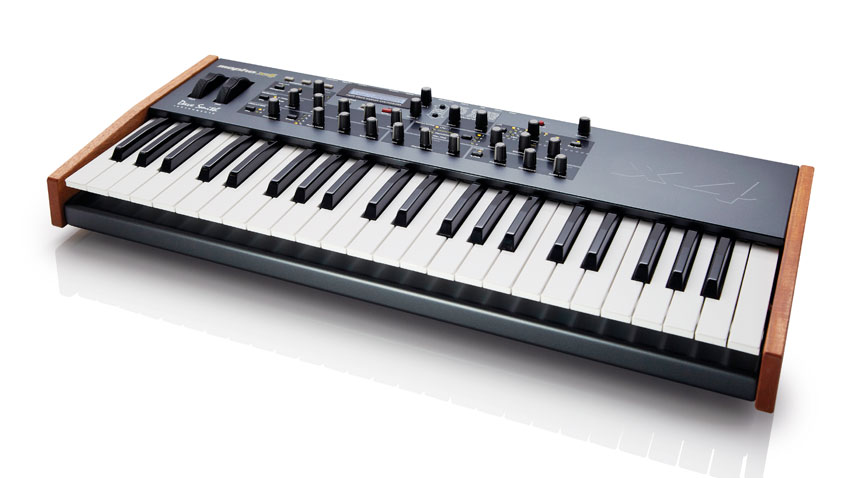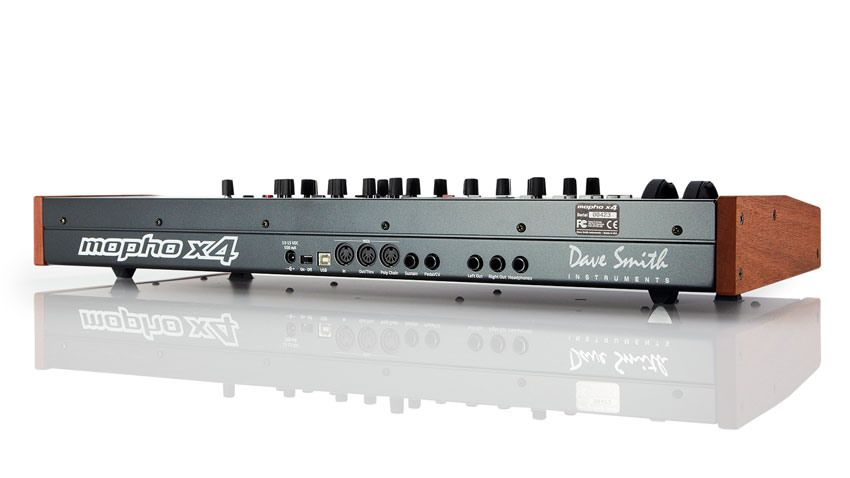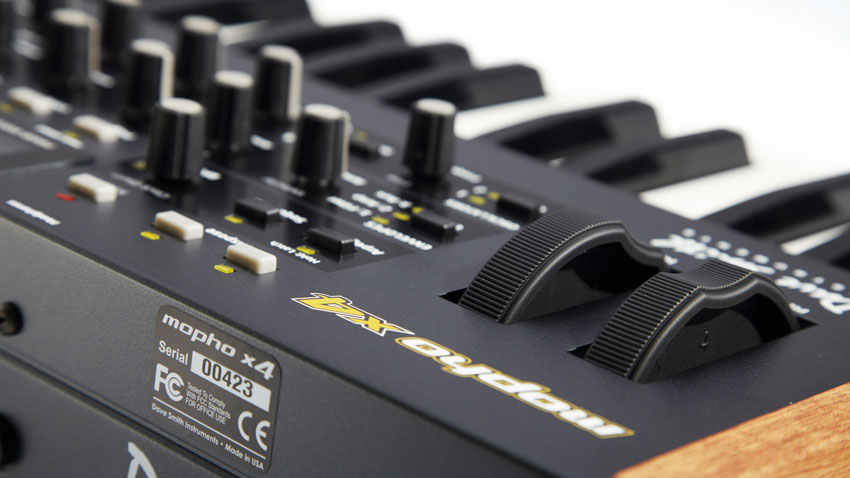MusicRadar Verdict
Great sounding and well featured, the X4 is a must to check out in the sub £1,000 bracket.
Pros
- +
Compact, portable and solid build quality. Sequencer, arpeggiator and powerful mod section. Costs less than £1,000.
Cons
- -
No multi-timbrality or audio input.
MusicRadar's got your back

Dave Smith Instruments Mopho X4

Dave Smith Instruments Mopho X4 (rear)

Dave Smith Instruments Mopho X4 (controls)
The garish little Mopho desktop analogue synth certainly turned heads when it was launched in late 2008 - not just for its standout colour but also for its standout sound and versatile feature set, and all for less than £300.
Two years later the Mopho keyboard added a nice knobby interface, pitch/ mod wheels and a 32-note keyboard to the monophonic synth engine. Now for 2012, the Mopho has turned into a four-voice polyphonic beast.
Whether you love or hate the Mopho keyboard's yellow livery, the X4's black looks much more classy (except perhaps for the slightly tacky X4 logo). Priced at £950, it certainly feels the part with a surprisingly weighty metal case and real wood ends.
The controls feel reassuringly solid too, perhaps even more so than the Prophet 08, and the push switches feel identical to the Tempest. Note that the control panel layout is exactly the same as the Mopho keyboard, so there are some compromises.
For instance, the three envelopes use a shared set of dials with a selector button (amp/filter/ pitch) and it can be a little tiresome having to flip between envelopes and remembering where you set them.
"The 44-note semi-weighted keyboard feels exactly the same as the action on the Prophet 08 and Mopho keyboard"
The 44-note semi-weighted keyboard feels exactly the same as the action on the Prophet 08 and Mopho keyboard. This is a good thing as the DSI keybeds are some of the nicest synth actions around. The note range is a fair compromise, though it would have been better to have a full four octaves.
There are of course octave buttons, though we wish these had an immediate effect on the sound when you're holding a chord - you have to retrigger the chord to get the switches to take effect.
Want all the hottest music and gear news, reviews, deals, features and more, direct to your inbox? Sign up here.
We're glad that the keyboard has aftertouch as it's often missing on keyboards (even at this price) and the aftertouch responds smoothly and predictably.
Four play
The basic architecture is the same as the Mopho keyboard, though it's now four-voice polyphonic. There are two DCOs per voice (with sawtooth, triangle, saw/triangle, variable pulse width square waves and hard sync) plus two sub oscillators per voice (one octave up and one octave down for thickening the sound).
In addition, there's a feedback circuit that feeds the X4's output back into itself for thickening and distorting the sound, though unfortunately the X4 has lost the audio input from the Mopho keyboard.
Obviously this is to save costs but it's a feature that a lot of potential customers will lament the loss of. The Prophet 08 also suffers from a lack of audio in, so no running anything through the filters or envelopes.
"There are a dizzying number of modulation routings too for the money, plus four LFOs per voice, audio mod and noise"
Not surprisingly, the X4 sounds almost identical to the Prophet 08 but the addition of sub oscs and the feedback circuit gives it more punch in the bass department. The overriding character is bright, in-your-face, powerful and punchy.
Audio Example 1
There are a dizzying number of modulation routings too for the money, plus four LFOs per voice, audio mod and noise but the downside is you can't stack, layer or split sounds like the Prophet or the Tetra, nor can you use it as four independent mono synths on separate MIDI channels as the X4 is mono-timbral.
Just to be clear - this is not a Tetra keyboard, it's a polyphonic Mopho. Again, this is a cost-cutting move by DSI, enabling the X4 to hit the sub £1,000 mark but nonetheless even two-part multi-timbrality like the Prophet 08 would have been handy.
Audio Example 2
The X4 filters (four-pole and two-pole) are very wide sounding frequency-wise, with really subby lows and extreme sizzling highs, which we really dig. The four-pole is our favourite with a really juicy resonance and bright cutoff that begs to be tweaked.
It makes it easy to get very cutting lead sounds and effects, though the low end is still not quite as refined and smooth as a Moog. The envelopes are pretty snappy, though, and I've a feeling they've been tweaked to be a little faster than the Prophet 08.
Cool running
Perhaps the weakest area of the X4 is warm/smooth pad making - something to do with the way the filters are voiced and the high-mid bump that the DCO/ filter combination exhibits.
You can get there with extra EQ but the in-your-face character tends to dominate. Note that the two-pole filter doesn't self-oscillate and is a little tamer sounding but it's still an important feature.
Unfortunately, there's still no filter multi-mode - so no band pass or notch and no high pass (like the Tempest). The use of DCOs gives too clean a sound at times but the oscillator slop parameter does go some way to offsetting this. Also, watch out that you don't run levels too hot internally, as the X4's signal path can distort in a not too pleasant way if you push it too hard.
In terms of polyphony, four notes is fine for most polysynth tasks but five would have been killer - especially if you tend to play four-note chords in the right hand and one note in the bass. You can find yourself running out of polyphony so you may have to adapt your playing style and chord voices a little.
Audio Example 3
We're sure those of you looking for more than four voices are starting to ask which is better: a Prophet 08 module, Prophet 08 keyboard or an X4 plus Tetra?
Price-wise, a Prophet 08 keyboard can be had for £1,400, the Prophet 08 module comes in at £1,085, while an X4 plus Tetra will cost £1,477. We'd choose the 08 if you already have a decent MIDI controller. It gives you four extra voices, bi-timbrality, splitting, layering and more dedicated controls for just £150 more than the X4.
"The X4 sounds like the Prophet 08, yet it's £500 less, it's very compact and self contained, versatile, well built, fairly easy to navigate"
If you want a self-contained eight-voice analogue poly, then the Prophet 08 is a very strong synth and remains unchallenged in the analogue world at its price point - bagging a Juno 106 second-hand is a good alternative but it still can't really compete feature-wise.
If you have no desire for more than four voices and require a high quality keyboard with aftertouch, then the X4 is for you, though of course you can polychain further DSI products to augment the features and voice count. So perhaps the best deal for those wanting more than four-voice poly is the X4 plus Tetra, which appears to be the most flexible setup.
You get five-part multi-timbrality, two separate compact synths, sub oscs, a feedback circuit plus an audio input (on the Tetra) though you lose the 08's five-octave keyboard.
What's great about these options is they all give you the same DSI family sound regardless of price point. The X4 sounds like the Prophet 08, yet it's £500 less, it's very compact and self contained, versatile, well built, fairly easy to navigate and it's a great base unit to add more voices to in the future, making it a great investment.
Some corners have been cut to bring it in at the price, and we really miss multi- timbrality and an audio input, but when you consider that the X4 is the only analogue four-voice keyboard-equipped poly with aftertouch at the sub £1,000 mark, you're prepared to let these issues slide a little!
It's always nice to have more but the fact is the X4 strikes a good balance at the right price. For this reason alone, the X4 deserves to sell in bucket loads. Once again, DSI have shaken up the analogue synth market. Exciting times for analogue heads.